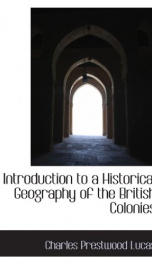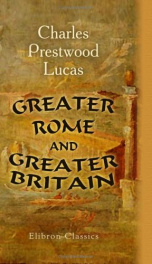introduction to a historical geography of the british colonies

Purchase of this book includes free trial access to www.million-books.com where you can read more than a million books for free. This is an OCR edition with typos. Excerpt from book: CHAPTER IV. Chapter IV. Three modes of colonising. I. By individuals, they have generallv been protected by the state. MODES OP COLONISING AND KINDS OP COLONISTS. 1. Colonisation can be carried out by individual men apart from the state, by the state itself, or by private enterprise aided by the state. There is no need to repeat examples of the first of these three methods of colonising. Many instances might be given, such as the ancient Greek colonies, the earliest of the Puritan settlements in America, and others. But jt is worth while to point out that in any case there must be some association of persons to make a colony; and that, when companies have been deliberately formed to promote a scheme of colonisation, they have generally, if not always, been to some extent protected and privileged by the state. While Robinson Crusoe lived alone, and even after he was joined by Friday, he can scarcely be said to have colonised his island. Colonisation began with the arrival of the Spaniards, and of Will Atkins and his comrades. Here there was no deliberate formation of a colonising company: if there had been, Crusoe would probably have sought and obtained a charter from the English government: and, even as things were, supposing the romance to have been turned into history, Crusoe's island would doubtless soon have come under the wing of the state. The mutineers of the Bounty who settled in Pitcairn island, may be quoted as an instance of deliberate colonisation, unaided by the state. But in the first place it is clear that this settlement was far removed from a carefullyplanned, businesslike scheme of colonising; and in the Chapter second place it will be remembered that as years have gone on, the Pitcairn islanders have received at least indirect encouragemen... --This text refers to an alternate Paperback edition.
Info about the book
Author:
Series:
Unknown
ISBN:
0199211280
Rating:
3.5/5 (1)Your rating:
0/5
Languge:
English
Users who have this book
Users who want this book
What readers are saying
What do you think? Write your own comment on this book!
write a commentif you like introduction to a historical geography of the british colonies try:
Do you want to exchange books? It’s EASY!
Get registered and find other users who want to give their favourite books to good hands!



